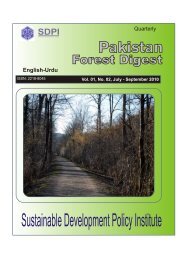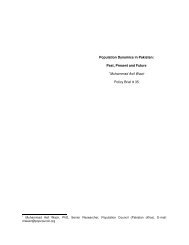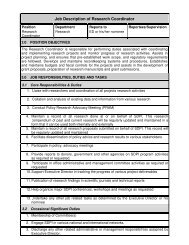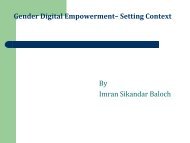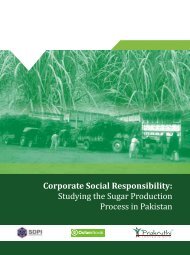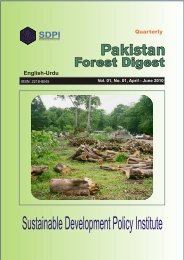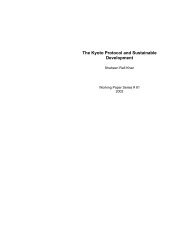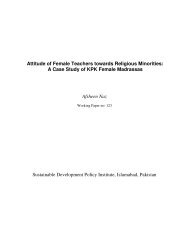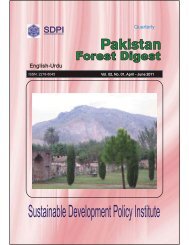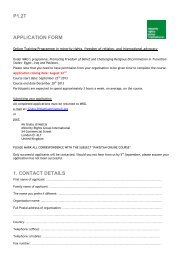Annual Report 2009-10 - Sustainable Development Policy Institute
Annual Report 2009-10 - Sustainable Development Policy Institute
Annual Report 2009-10 - Sustainable Development Policy Institute
- No tags were found...
Create successful ePaper yourself
Turn your PDF publications into a flip-book with our unique Google optimized e-Paper software.
<strong>Annual</strong> <strong>Report</strong><strong>2009</strong> - 20<strong>10</strong>Situation AnalysisAssessment of Landlord Tenant Relationships in Flood RecoveryThe captioned study was funded by the World Food Program and was carried out to provide aqualitative understanding of opportunities and constraints for recovery for tenants and landlordsin the flood hit area based on the dynamics of relations between the two. Three locales were selectedto represent the overall situation in provinces i.e. Charsadda from Khyber Pakhtunkhwa(KP), Muzaffargarh from Punjab and Shikarpur from Sindh.The study was accomplished by liaising with the local media and CSOs for identification of targetgroups and through Focus Group Discussions (FGDs) with the intention of documenting localnarratives.. FGDs were conducted with contractors, small and big landowner and tenantfamilies from the sampled flood affected areas. Female groups in these categories were alsointerviewed separately. Key-informant interviews were also conducted with the help of questionguidelines to gain insight into the prevailing distribution mechanism. The key informants includedall those actors who are either involved in the provision of the relief goods for agriculturelike NGOs, CBOs, district administration and landlords.In light of the above data collected from the sampled districts it was evident that no formal supportthrough the proper mechanism was being received by the flood affected people in the sectorof agriculture, which is the main source of income in these districts. This is even more seriouswhen we consider that 45% of the labour force in the country is employed in the agriculturesector. The economic level of the small land owners, contractors and tenant has been badly hitwhich has forced them to work as laborers to meet the needs of their families. On the otherhand the exploitative and dominating relation of the big landlords has deprived the tenants of thelittle help that could have been useful to revive not more but some of these agriculture basedcommunities. The devastation is mostly in the rural areas, which is the hub of livestock. There isa serious threat to the food security of the people of the country at large. Big landlords and politicianshave turned the devastation into an opportunity for them to hoard the aid and built politicalcareers. There is a probability for these circumstances to give rise to a force of looters and militants.Discussions with the participants reveal that so far the distribution mechanism for relief goodshas not been effective. In initial days of disaster a lot of food and shelters were supplied to thedevastated farmers and small landowners but as the time has passed by interest towards supplyof the basics is also very low. Women on the other hand are deprived of the direct wages andentitlement to any post flood relief.The recommendations that have come out of the study include the following:• The influence of political parties and big landlords has to be warded off from the distribution mechanism to make it more transparent and accessible for the poor;• WATAN card distribution and registration should be made more transparent to avoid theobstacles that are encountered to acquire it;• Provision of livestock to the tenants and contractors;• Women should be directly entitled to the relief goods and agriculture inputs;• Loans should be announced for the small landowners and tenants.For further information contact Ms. Mome Salim. mo me@sdpi.org42S u s t a I n a b l e D e v e l o p m e n t P o l I c y I n s t I t u t e



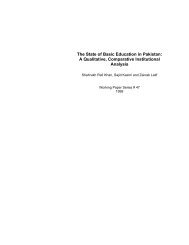
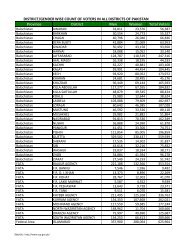
![(October - December, 2010) [13th SDC Special Bulletin]](https://img.yumpu.com/50118608/1/184x260/october-december-2010-13th-sdc-special-bulletin.jpg?quality=85)
